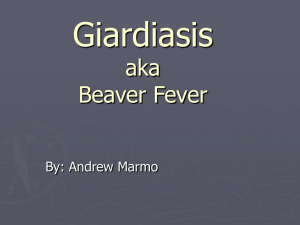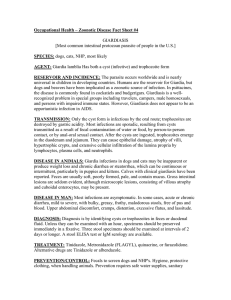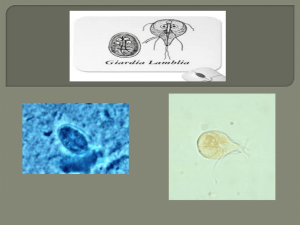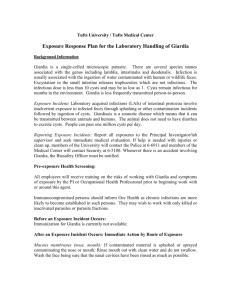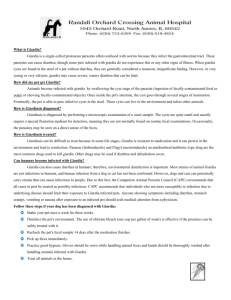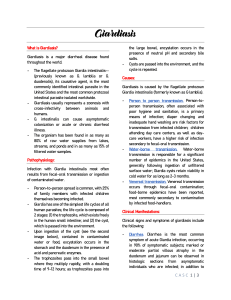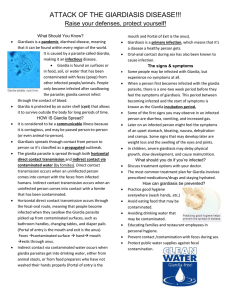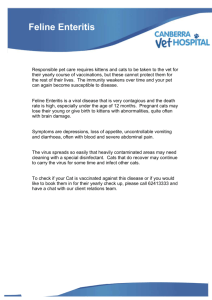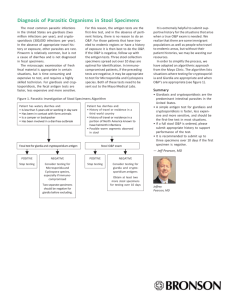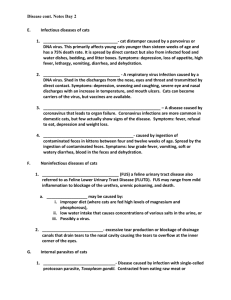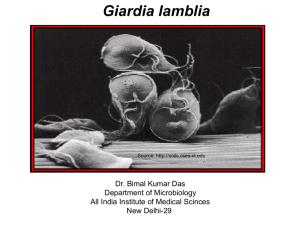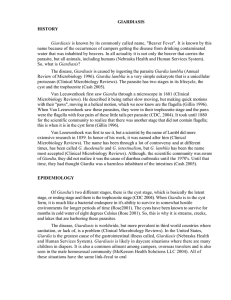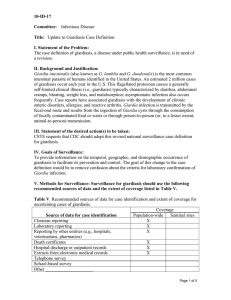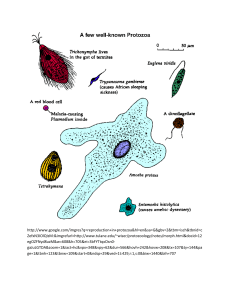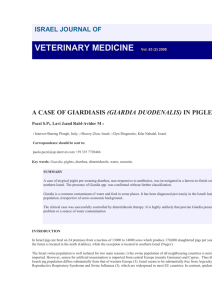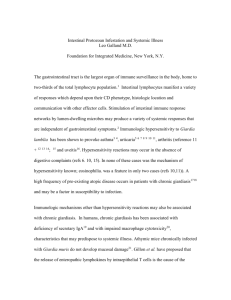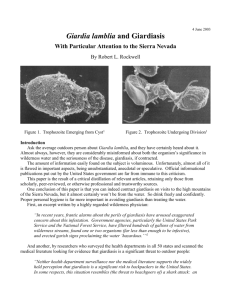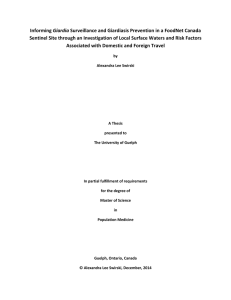GIARDIA IN CATS - Liles Animal Clinic
advertisement
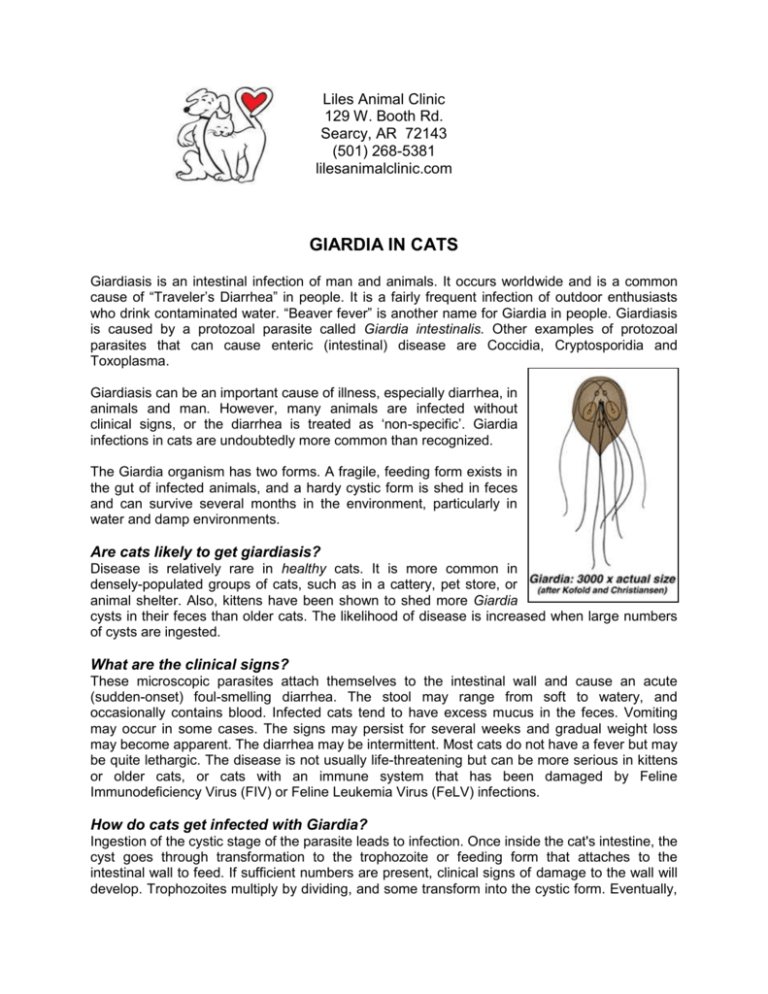
Liles Animal Clinic 129 W. Booth Rd. Searcy, AR 72143 (501) 268-5381 lilesanimalclinic.com GIARDIA IN CATS Giardiasis is an intestinal infection of man and animals. It occurs worldwide and is a common cause of “Traveler’s Diarrhea” in people. It is a fairly frequent infection of outdoor enthusiasts who drink contaminated water. “Beaver fever” is another name for Giardia in people. Giardiasis is caused by a protozoal parasite called Giardia intestinalis. Other examples of protozoal parasites that can cause enteric (intestinal) disease are Coccidia, Cryptosporidia and Toxoplasma. Giardiasis can be an important cause of illness, especially diarrhea, in animals and man. However, many animals are infected without clinical signs, or the diarrhea is treated as ‘non-specific’. Giardia infections in cats are undoubtedly more common than recognized. The Giardia organism has two forms. A fragile, feeding form exists in the gut of infected animals, and a hardy cystic form is shed in feces and can survive several months in the environment, particularly in water and damp environments. Are cats likely to get giardiasis? Disease is relatively rare in healthy cats. It is more common in densely-populated groups of cats, such as in a cattery, pet store, or animal shelter. Also, kittens have been shown to shed more Giardia cysts in their feces than older cats. The likelihood of disease is increased when large numbers of cysts are ingested. What are the clinical signs? These microscopic parasites attach themselves to the intestinal wall and cause an acute (sudden-onset) foul-smelling diarrhea. The stool may range from soft to watery, and occasionally contains blood. Infected cats tend to have excess mucus in the feces. Vomiting may occur in some cases. The signs may persist for several weeks and gradual weight loss may become apparent. The diarrhea may be intermittent. Most cats do not have a fever but may be quite lethargic. The disease is not usually life-threatening but can be more serious in kittens or older cats, or cats with an immune system that has been damaged by Feline Immunodeficiency Virus (FIV) or Feline Leukemia Virus (FeLV) infections. How do cats get infected with Giardia? Ingestion of the cystic stage of the parasite leads to infection. Once inside the cat's intestine, the cyst goes through transformation to the trophozoite or feeding form that attaches to the intestinal wall to feed. If sufficient numbers are present, clinical signs of damage to the wall will develop. Trophozoites multiply by dividing, and some transform into the cystic form. Eventually, the cat is able to pass infective cysts in the stool, where they can contaminate the environment and infect other cats. Infection can also occur from drinking water that has been contaminated with the cysts. How is Giardia is diagnosed? Stool (feces) samples are examined in the laboratory. Because of the prevalence of Giardia in the cat, the presence of cysts in the stool does not necessarily indicate that a problem is present. However, when the cysts are present in a cat with diarrhea, it is likely significant. Although a fecal examination is needed for diagnosis, the routine flotation test may fail to detect these small cysts. A special solution may be needed for accurate identification of the cysts in the stool. Occasionally, the parasites may be seen on a direct smear of the feces. Tests are available for detection of antigens (cell proteins) of Giardia in the feces. These tests may be run in the veterinary hospital or submitted to an outside laboratory. Most cases are diagnosed on medical history and clinical signs suggestive of Giardiasis. What is the treatment? Metronidazole is the drug most commonly used to treat Giardiasis. It is a tablet that is given orally for five to seven days. Other drugs may be needed as supplemental therapy should diarrhea and dehydration occur. Another antiparasitic drug, fenbendazole, is suggested as a potentially useful treatment. It appears to be very effective and may be used in cats with refractory diarrhea as a means of diagnosing and treating Giardia. What is the prognosis for Giardiasis? The prognosis is good in most cases. Debilitated or geriatric animals and those with incompetent immune systems are at increased risk for complications, including death. Can Giardia affect me or my family? Giardiasis is the most common intestinal parasitic infection of man. In the past, it has been assumed that cats and dogs, along with wildlife, served as an important source of infection for humans. However human-to-human transmission is also important and contaminated municipal water supplies are responsible for some outbreaks. Caution is advised when a pet has been diagnosed with giardiasis. In particular, people with immunodeficient states such as with AIDS or undergoing chemotherapy should use extreme care. For environmental disinfection, a cup of chlorine bleach in a gallon of water (66ml/L) is effective. However, be sure that the surfaces and premises can be safely treated with bleach. Can Giardia be prevented? Vaccines are available and should be used if your veterinarian determines your cat is at high risk for contracting Giardiasis. Vaccination should only be pursued after thorough discussion with your veterinarian. This client information sheet is based on material written by Ernest Ward, DVM © Copyright 2005 Lifelearn Inc. Used with permission under license. February 13, 2016
